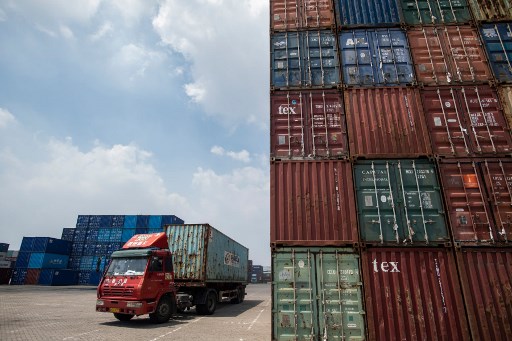Trump turns up the heat in trade conflict with China

A truck transports a container next to stacked containers at a port in Zhangjiagang in China’s eastern Jiangsu province. (AFP)
WASHINGTON–President Donald Trump threatened Friday to slap tariffs on all of the Chinese goods imported into the United States, ramping up the already tense trade relations with Beijing amid ongoing talks with Canada and the EU.
His comments, which contradicted the more diplomatic remarks earlier Friday from his top economic adviser, sent the stock market plunging amid fears of the economic damage that could result from the multi-front trade war he pursues.
The United States already has punitive tariffs on $50 billion in Chinese goods in place and another $200 billion are “in the hopper” and “could take place very soon,” Trump said.
But he told reporters traveling with him to Fargo, North Dakota that “behind that, there’s another $267 billion ready to go on short notice if I want.”
That would cover virtually all the goods imported from the world’s second largest economy.
Article continues after this advertisement“That totally changes the equation,” Trump said.
Article continues after this advertisementWhite House economic adviser Larry Kudlow just hours before said talks with Beijing were continuing to try to defuse the conflict, and that he was hopeful that a solution could be found.
And there have been more positive signs in talks with North American partners as well as with the European Union.
US Trade Representative Robert Lighthizer held another day of meetings with Canada’s Foreign Minister Chrystia Freeland on a rewrite of the North American Free Trade Agreement, after reaching a deal last week with Mexico.
However, Freeland left Washington without a deal in hand and the schedule for any future talks was uncertain.
Lighthizer is due to meet Monday in Brussels with EU Trade Commissioner Cecilia Malmstrom to resolve the dispute ignited when Trump imposed steep duties on all steel and aluminum imports.
And Freeland is due to attend a Liberal Party meeting on Wednesday and Thursday prior to the opening of Parliament.
– China a ‘bigger problem’ –
“China, right now, is a far bigger problem,” Trump said. “I’m being strong on China because I have to be.”
The deadline for public comment on the next wave of punitive taxes on $200 billion of annual imports from China expired Thursday, so Trump could impose the tariffs immediately.
He previously had threatened to hit 100 percent of imports from China if the country failed to address US concerns over theft of US technology and barriers to American goods and investments.
Trump has had Beijing in his crosshairs since he took office and has applied increasing pressure to try to convince it to change its policies, allow more US imports and reduce the $335-billion US trade deficit with China.
China so far has retaliated dollar-for-dollar with tariffs of its own on US goods but since it imports less than $200 billion in goods a year from the United States, it has run out of room to match the punitive measures.
But businesses warn there are other ways China can strike back, through regulations and other administrative means, or even through sales of its large holdings of US Treasury debt.
The last effort at a negotiated solution came in late August with meetings between low-level officials, but nothing came of it.
In Beijing, China’s Commerce Ministry said Thursday it was ready to retaliate.
“If the US dogmatically implements any new tariff measures against China, China will have to take the necessary countermeasures,” commerce spokesman Gao Feng told reporters.
Those steps include slapping tariffs on $60 billion of US imports, Gao said.
– NAFTA talks 24/7 –
Trump said talks with Canada to revise the 25-year-old NAFTA were “moving along” but again called the agreement “one of the worst trade deals in history.”
“Canada has been ripping us off for a long time. Now, they’ve got to treat us fairly,” he said, and again threatened to impose duties on cars produced in Canada.
Last week, Washington reached a new deal with Mexico and is pushing to sign a revamped NAFTA before December 1, when the next president takes over in Mexico City.
Following meetings on Friday, Freeland told reporters the issues were “complicated” but that officials were working “really at this point 24/7.”
However, she seemed to have a different position than Mexican Economy Minister Ildefonso Guajardo on the relationship between the NAFTA talks and the US steel and aluminum tariffs.
Guajardo said Thursday it would be “very strange” to sign a new NAFTA “when this trade war is pending.”
“So the idea would be to table a solution to these trade aggressions before signing,” Guajardo said at a conference in Mexico City.
But Freeland said on Thursday the metals tariffs and NAFTA talks “are entirely separate” — although she again called them “unjustified and illegal.”
The NAFTA talks between Washington and Ottawa have been hung up over Canada’s insistence on retaining a dispute resolution mechanism in Chapter 19 and US objections over Ottawa’s tight controls over the dairy market.